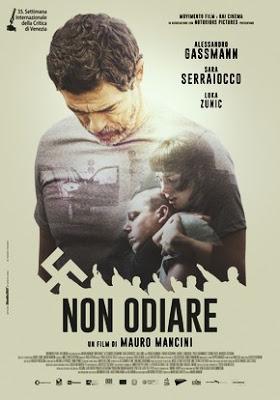
“I wanted what the characters don’t say to each other to be more important than what they do say to each other”
---Director Mauro Mancini’s statement to interviewer Davide Abbatescianni, in Cineuropa, after the film competed in the International Critics’ Week at the 2020 Venice film festival
Debut feature films are, in most cases, interesting films because the directors invest a lot of fresh thought as in the prime examples of Welles, Melville, Chabrol, Ridley Scott, Mike Nichols, Spielberg and the Coen brothers. So too, Mauro Mancini’s first feature film Thou Shalt Not Hate makes an unusual impact where spoken words take a back seat and silent actions speak louder.
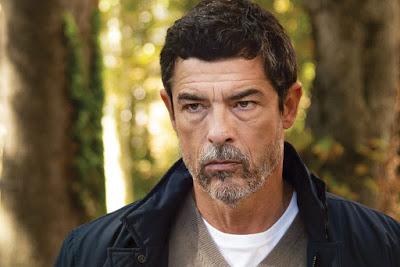
Alessandro Gassmann in the Venice award-winning
role of the reputed Jewish surgeon
The hate in the film refers to the continuing hatred over generations between the Nazis/the neo-Nazis and the survivors of the holocaust (and their progenies), surfacing in contemporary Italy. The strength of the film does not lie in the tale that unfolds but more in the way it is presented. The film stands out as a result of the combined creative abilities of the director/scriptwriter, his co-scriptwriter, and the lead actors that present a simple tale, intelligently told.
The film opens with a scene where a father asks his young son to drown several kittens of a brood but retain one. The film ends with an adult re-visiting the same spot alone. The two key sequences do not seem to have a direct connection with “hatred” depicted in the main tale of the film but it does connect up with ideas/prejudices passed on by one generation to another. While many viewers are likely to spot the obvious tensions and hatred between the neo-Nazis and the Jews in the film, viewers are less likely to note the contrasting relationships between father and son within the two groups, presented in Thou Shalt Not Hate. In one group (the neo-Nazis), the son idolizes the father and his views, in the other (the Jewish Italian) there is almost very little evidence of any close connection between father and son in spite of working in closely connected professions. Interestingly, the mother figures in both groups are almost absent in the film’s script. The tale is either intentionally or unintentionally patriarchal.
In terms of religion, the title of the film Thou Shalt Not Hate is not a Jewish/Christian commandment but mirrors the Commandment “Love Thy Neighbor as Thyself.” The film extends this view not just to human beings but to man-animal relationships as well. In contrast to the drowning of the innocent kittens that open the film, a fierce dog guarding the house of the dead dentist viciously snarls at his dentist’s son who had not met his father for a long while. Later sequences with few spoken words, explain the gradual bonding of the dog for his new owner. Another detail that may not be obvious is the burial of the neo-Nazi in a Christian cemetery without a priest, a prayer, or a Bible reading.
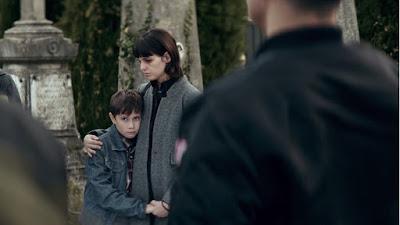
When a neo-Nazi dies, his daughter is the only
female mourner
The remarkable abilities of the director Mancini and his co-scriptwriter Lisino are apparent in scenes where no words are spoken and music is not used as a crutch to lift the emotions of the viewer. One such scene is the decision of the doctor to visit the police station to lodge a complaint (not a knee-jerk reaction) on being attacked as he first chose to go home and attend to his wounds and mulled over what to do next. He then turns back after pressing the door bell of the police station and almost opening the door that was remotely unlocked for him to enter. Another is a scene in a supermarket, where he chances to spot his housemaid at work from a distance. He departs discretely without interacting with her. The visuals and the editing speak more eloquently than spoken words. In another scene, the subtle ingrained reaction of the maid while travelling in a crowded bus towards an innocent black immigrant sitting close to her is delicately captured by the filmmakers. So is the subtle visual comparison of the old furniture stacked up in the Jewish father’s house along with clues to identify Nazis responsible for the holocaust meticulously being researched by the dead dentist, while his Jewish son lives in a clean and modern apartment without any clutter. The film studies attitudinal changes in families over a generation with love and forgiveness replacing intense hate. Even consensual sex between two evolved adult individuals from the two groups does not take place because they do not feel it is appropriate, indicating the maturity of the screenplay writers.
While Thou Shalt Not Hate has an early sequence exhibiting the innate hateful action for neo-Nazis from a reserved, otherwise cool-headed Jewish doctor leading to the death of an “accident” victim, the rest of the film relates to the doctor going out of the way to procure public information on the victim and his family and attempt to discretely provide succor to the family of the deceased to compensate his hate-ridden, knee-jerk action on reaching the accident site.
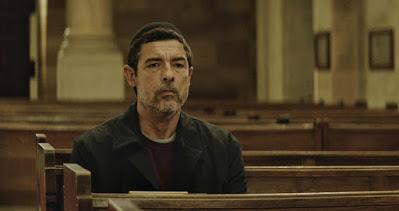
The doctor seeks redemption for his hate
in an empty synagogue
The film recalls the Polish director Krzysztof Kieslowski’s sophisticated ten part Dekalog (Decalogue) on the ten Jewish/Christian commandments and Kieslowski’s incredible continuous collaboration with co-scriptwriter Krzysztof Piesciewicz that followed. It appears director Mancini is following in Kieslowski’s footsteps by continuing his collaboration with his co-scriptwriter Davide Lisino on his next film project.
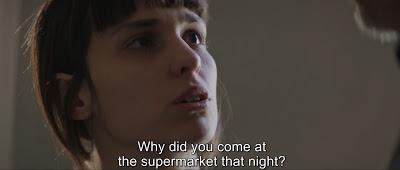
Sara Serraiocco, plays the housemaid
to the Jewish doctor
Apparently Mancini and Lisino developed the story after reading a news item about a surgeon who refused to surgically operate a neo-Nazi years ago and developed the film script keeping actor Alessandro Gassman in mind. Gassman appears as an Italian version of Hugh Laurie playing Dr House (minus the limp, of course) and his laconic performance won him the Venice acting award. (Alessandro is the famous Italian actor Vittorio Gassman’s son.) Mancini very aptly paired Alessandro with the equally talented actress Sara Serraiocco, who has been playing major roles in recent award winners at the Cannes and the Berlin film festivals. The casting choices added value to the film. The future collaborative works of Mancini and Lisino will indeed be worth waiting for.
P.S. Thou Shalt Not Hate won the best actor (Pasinetti) award for Alessandro Gassmann and the award for the best Italian film at the 2020 Venice film festival.The film is participating in the 2020 Denver Film Festival, USA.

